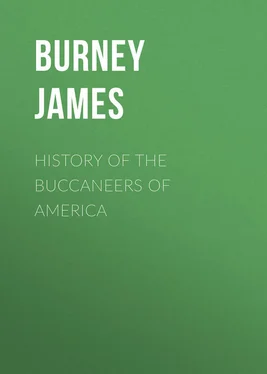James Burney - History of the Buccaneers of America
Здесь есть возможность читать онлайн «James Burney - History of the Buccaneers of America» — ознакомительный отрывок электронной книги совершенно бесплатно, а после прочтения отрывка купить полную версию. В некоторых случаях можно слушать аудио, скачать через торрент в формате fb2 и присутствует краткое содержание. Жанр: foreign_antique, foreign_prose, на английском языке. Описание произведения, (предисловие) а так же отзывы посетителей доступны на портале библиотеки ЛибКат.
- Название:History of the Buccaneers of America
- Автор:
- Жанр:
- Год:неизвестен
- ISBN:нет данных
- Рейтинг книги:4 / 5. Голосов: 1
-
Избранное:Добавить в избранное
- Отзывы:
-
Ваша оценка:
- 80
- 1
- 2
- 3
- 4
- 5
History of the Buccaneers of America: краткое содержание, описание и аннотация
Предлагаем к чтению аннотацию, описание, краткое содержание или предисловие (зависит от того, что написал сам автор книги «History of the Buccaneers of America»). Если вы не нашли необходимую информацию о книге — напишите в комментариях, мы постараемся отыскать её.
History of the Buccaneers of America — читать онлайн ознакомительный отрывок
Ниже представлен текст книги, разбитый по страницам. Система сохранения места последней прочитанной страницы, позволяет с удобством читать онлайн бесплатно книгу «History of the Buccaneers of America», без необходимости каждый раз заново искать на чём Вы остановились. Поставьте закладку, и сможете в любой момент перейти на страницу, на которой закончили чтение.
Интервал:
Закладка:
The first discovery of Columbus set in activity the curiosity and speculative dispositions of all the European maritime Powers. King Henry the VIIth, of England , as soon as he was certified of the existence of countries in the Western hemisphere, sent ships thither, whereby Newfoundland , and parts of the continent of North America , were first discovered. South America was also visited very early, both by the English and the French; 'which nations,' the Historian of Brasil remarks, 'had neglected to ask a share of the undiscovered World, when Pope Alexander the VIth partitioned it, who would as willingly have drawn two lines as one; and, because they derived no advantage from that partition, refused to admit its validity.' The West Indies , however, which doubtless was the part most coveted by all, seem to have been considered as more particularly the discovery and right of the Spaniards; and, either from respect to their pretensions, or from the opinion entertained of their force in those parts, they remained many years undisturbed by intruders in the West Indian Seas . But their homeward-bound ships, and also those of the Portuguese from the East Indies , did not escape being molested by pirates; sometimes by those of their own, as well as of other nations.
CHAPTER II
1492-3. Hayti, or Hispaniola, the first Settlement of the Spaniards in America. The first settlement formed by the Castilians in their newly discovered world, was on the Island by the native inhabitants named Hayti ; but to which the Spaniards gave the name of Española or Hispaniola . And in process of time it came to pass, that this same Island became the great place of resort, and nursery, of the European adventurers, who have been so conspicuous under the denomination of the Buccaneers of America .
The native inhabitants found in Hayti , have been described a people of gentle, compassionate dispositions, of too frail a constitution, both of body and mind, either to resist oppression, or to support themselves under its weight; and to the indolence, luxury, and avarice of the discoverers, their freedom and happiness in the first instance, and finally their existence, fell a sacrifice.
Queen Ysabel, the patroness of the discovery, believed it her duty, and was earnestly disposed, to be their protectress; but she wanted resolution to second her inclination. The Island abounded in gold mines. The natives were tasked to work them, heavier and heavier by degrees; and it was the great misfortune of Columbus, after achieving an enterprise, the glory of which was not exceeded by any action of his contemporaries, to make an ungrateful use of the success Heaven had favoured him with, and to be the foremost in the destruction of the nations his discovery first made known to Europe .
Review of the Dominion of the Spaniards in Hispaniola. The population of Hayti , according to the lowest estimation made, amounted to a million of souls. The first visit of Columbus was passed in a continual reciprocation of kind offices between them and the Spaniards. One of the Spanish ships was wrecked upon the coast, and the natives gave every assistance in their power towards saving the crew, and their effects to them. When Columbus departed to return to Europe , he left behind him thirty-eight Spaniards, with the consent of the Chief or Sovereign of the part of the Island where he had been so hospitably received. He had erected a fort for their security, and the declared purpose of their remaining was to protect the Chief against all his enemies. Several of the native Islanders voluntarily embarked in the ships to go to Spain , among whom was a relation of the Hayti Chief; and with them were taken gold, and various samples of the productions of the New World .
Columbus, on his return, was received by the Court of Spain with the honours due to his heroic achievement, indeed with honours little short of adoration: he was declared Admiral, Governor, and Viceroy of the Countries that he had discovered, and also of those which he should afterwards discover; he was ordered to assume the style and title of nobility; and was furnished with a larger fleet to prosecute farther the discovery, and to make conquest of the new lands. The Instructions for his second expedition contained the following direction: 'Forasmuch as you, Christopher Columbus, are going by our command, with our vessels and our men, to discover and subdue certain Islands and Continent, our will is, that you shall be our Admiral, Viceroy, and Governor in them.' This was the first step in the iniquitous usurpations which the more cultivated nations of the world have practised upon their weaker brethren, the natives of America .
1493. Government of Columbus. Thus provided and instructed, Columbus sailed on his second voyage. On arriving at Hayti , the first news he learnt was, that the natives had demolished the fort which he had built, and destroyed the garrison, who, it appeared, had given great provocation, by their rapacity and licentious conduct. War did not immediately follow. Columbus accepted presents of gold from the Chief; he landed a number of colonists, and built a town on the North side of Hayti , which he named after the patroness, Ysabel , and fortified. 1494. A second fort was soon built; new Spaniards arrived; and the natives began to understand that it was the intention of their visitors to stay, and be lords of the country. The Chiefs held meetings, to confer on the means to rid themselves of such unwelcome guests, and there was appearance of preparation making to that end. The Spaniards had as yet no farther asserted dominion, than in taking land for their town and forts, and helping themselves to provisions when the natives neglected to bring supplies voluntarily. The histories of these transactions affect a tone of apprehension on account of the extreme danger in which the Spaniards were, from the multitude of the heathen inhabitants; but all the facts shew that they perfectly understood the helpless character of the natives. A Spanish officer, named Pedro Margarit, was blamed, not altogether reasonably, for disorderly conduct to the natives, which happened in the following manner. He was ordered, with a large body of troops, to make a progress through the Island in different parts, and was strictly enjoined to restrain his men from committing any violence against the natives, or from giving them any cause for complaint. But the troops were sent on their journey without provisions, and the natives were not disposed to furnish them. The troops recurred to violence, which they did not limit to the obtaining food. If Columbus could spare a detachment strong enough to make such a visitation through the land, he could have entertained no doubt of his ability to subdue it. But before he risked engaging in open war with the natives, he thought it prudent to weaken their means of resisting by what he called stratagem. Hayti was divided into five provinces, or small kingdoms, under the separate dominion of as many Princes or Caciques. One of these, Coanabo, the Cacique of Maguana , Columbus believed to be more resolute, and more dangerous to his purpose, than any other of the chiefs. To Coanabo, therefore, he sent an Officer, to propose an accommodation on terms which appeared so reasonable, that the Indian Chief assented to them. Afterwards, relying on the good faith of the Spaniards, not, as some authors have meanly represented, through credulous and childish simplicity, but with the natural confidence which generally prevails, and which ought to prevail, among mankind in their mutual engagements, he gave opportunity for Columbus to get possession of his person, who caused him to be seized, and embarked in a ship then ready to sail for Spain . The ship foundered in the passage. 1495. The story of Coanabo, and the contempt with which he treated Columbus for his treachery, form one of the most striking circumstances in the history of the perfidious dealings of the Spaniards in America . Dogs used in Battle against the Indians. On the seizure of this Chief, the Islanders rose in arms. Columbus took the field with two hundred foot armed with musketry and cross-bows, with twenty troopers mounted on horses, and with twenty large dogs 1 1 Lebreles de pressa.
!
Интервал:
Закладка:
Похожие книги на «History of the Buccaneers of America»
Представляем Вашему вниманию похожие книги на «History of the Buccaneers of America» списком для выбора. Мы отобрали схожую по названию и смыслу литературу в надежде предоставить читателям больше вариантов отыскать новые, интересные, ещё непрочитанные произведения.
Обсуждение, отзывы о книге «History of the Buccaneers of America» и просто собственные мнения читателей. Оставьте ваши комментарии, напишите, что Вы думаете о произведении, его смысле или главных героях. Укажите что конкретно понравилось, а что нет, и почему Вы так считаете.












